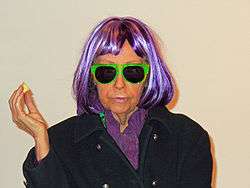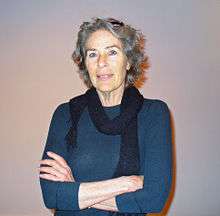Warhol superstars
Warhol superstars were a clique of New York City personalities promoted by the pop artist Andy Warhol during the 1960s and early 1970s. These personalities appeared in Warhol's artworks and accompanied him in his social life, epitomizing his famous dictum, "In the future everyone will be famous for fifteen minutes". Warhol would simply film them, and declare them "superstars".[1]
History

The first recognised superstar was Baby Jane Holzer, whom Warhol featured in many of his early film experiments. The superstars would help Warhol generate publicity while Warhol offered fame and attention in return. Warhol's philosophies of art and celebrity met in a way that imitated the Hollywood studio system at its height in the 1930s and 1940s.
Among the most well-known of Warhol's superstars was Edie Sedgwick. Sedgwick and Warhol became very close during 1965 but their relationship ended abruptly early in the next year. Warhol would continue to associate himself with people including Viva, Candy Darling, Ultra Violet, Nico and International Velvet.
Warhol's studio, the Factory, played host to most of his superstars and as his experiments in film continued he became more interested in the bohemian eccentrics attracted to the studio. Some of the most important superstars to emerge from the period of the first Factory (known as the 'Silver Factory' because silver foil had been applied to the walls and ceilings) include Paul America, Ondine, Taylor Mead, Rolando Peña, Mary Woronov, Eric Emerson, Gerard Malanga, Billy Name, Brigid Berlin and Sappheo.
In the later films, made in collaboration with Paul Morrissey, Warhol brought in new superstars including Joe Dallesandro, Penny Arcade, Andrea Feldman, Jane Forth, Geraldine Smith, Luke Wienecke and Sylvia Miles. During this period Warhol developed an increasing fascination with trans women and drag queens, and promoted Candy Darling, Holly Woodlawn and Jackie Curtis to superstar status.
Warhol significantly reduced his public accessibility after being shot by Valerie Solanas in 1968. The age of the Warhol superstar soon faded.
Films
Chelsea Girls (a film about life amongst the superstars at Hotel Chelsea) was the only film to achieve success beyond the confines of artistic New York.
The later Warhol/Morrissey collaborations Flesh, Trash, Heat and Women in Revolt, into which Warhol had little input, are more frequently seen.
List of Warhol superstars
- Paul America[2]
- Pat Ast
- Benedetta Barzini
- Richard Bernstein (artist who did the covers of Interview for 15 years)
- Susan Bottomly (later known as International Velvet)
- Jayne County
- Jackie Curtis
- Joe Dallesandro
- Candy Darling
- Isabelle Collin Dufresne (Ultra Violet)
- Eric Emerson
- Andrea Feldman
- Jane Forth
- Rolando Peña (also known as El Principe Negro / The Black Prince)[3]
- Cyrinda Foxe
- Bibbe Hansen (mother of musician Beck)
- Fred Herko
- Jane Holzer
- Naomi Levine
- Elecktrah Lobel (actress who starred in Kitchen and The Life of Juanita Castro)
- Gerard Malanga
- Taylor Mead
- Mario Montez
- Billy Name
- Nico
- Ondine
- Brigid Polk
- Edie Sedgwick
- Nick Sita
- Jack Smith
- Ingrid Superstar[4][5]
- Cherry Vanilla
- Viva
- Louis Waldon (The Nude Restaurant, Lonesome Cowboys, San Diego Surf, Flesh, Blue Movie)
- Chuck Wein
- Holly Woodlawn
- Mary Woronov
References
- ↑ David Denby (6 May 1996). "New York Magazine, Vol. 29, No. 18, "Her Revolution"". New York Media, LLC: 83. Retrieved 2011-02-19.
- ↑ "Paul America". warholstars.org. Retrieved 2011-02-19.
- ↑ De Oliveira, A.; Parra G., C. (August 2015). POP (Peña, Obregón, Perna) (in Spanish). Madrid, Spain: Galería Odalys & Fundación D.O.P. p. 19.
- ↑ "Ingrid Superstar". The Daily Telegraph. Retrieved 1 May 2017.
- ↑ MacDonald, Sarah (28 October 2015). "Who were Andy Warhol's Superstars? A guide to underground cinema's mysterious muses". Fashion. Retrieved 1 May 2017.
External links
- Warholstars Andy Warhol Films, Art and Superstars
_by_David_Shankbone.jpg)
